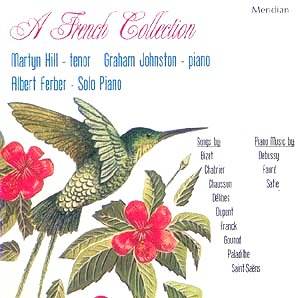A FRENCH COLLECTION
BIZET, CHABRIER, CHAUSSON, DELIBES, DUPONT, FRANCK,
GOUNOD, PALAHDIHE & SAINT-SAENS
Songs
DEBUSSY, FAURE, SATIE Piano pieces.
Martyn Hill (tenor) Graham Johnson (N.B. not Johnston!) & Albert
Ferber, (piano)
Meridian CDE 84417
[73.28]
Crotchet

At the moment when Graham Johnson's epic Hyperion Schubert Edition
reaches its penultimate stage, this charming sequence of digitally remastered
recordings, entitled The Birth of the Mélodie, sounds well
more than 20 years on. It is welcome, notwithstanding the extraordinary spelling
mistake on the cover, which betrays Meridian's poor control of detail in
presentation and proof checking. Also, since the composers' dates range from
1818 (birth of Gounod) to 1926 (death of Emile Paladihe) it should have been
axiomatic to give the dates of the songs and piano pieces chosen, if known.
There are no notes about the three artists (and one's first guess was that
an upstart accompanist might be trading on a famous name) but study of the
booklet quickly makes clear that this is another programme (like those of
the Songmakers' Almanac concerts) which exemplifies Graham Johnson's imagination
and his song-hunting instinct, which fuels indefatigable determination to
quarry rare, forgotten mélodies from second-hand book stores
and catalogues. Johnson is today's unchallenged heir to Gerald Moore, the
Unashamed Accompanist of yore. He is equally revered as was his mentor
and he is now the most famous of the trio of fine musicians recorded here;
at least his name is not given in smaller print as was usual!
However, first things first! All the texts, with English translations, are
given (in miniscule but legible print) together with a characteristic essay
by Graham Johnson. Examples by Gounod avoid toppling 'into the sentimental
and sanctimonious' and Franck 'remained dignified' whereas his imitators
created 'highly popular kitsch'. Bizet's Ouvre ton coeur is a
bolero from the composer of Carmen, but two Délibes songs are
surprisingly powerful and dramatic, as is the young Saint-Saens in La
cloche. Paladilhe's example is typical of high quality French salon song,
and Dupont provides an alternative Mandoline to those of Debussy &
Fauré. Best of all are two by Chabrier, greatest of the near-great
and a particular favourite of mine.
Martyn Hill sings them all with taste and elegance and exemplary French,
and the songs are separated by a few popular piano pieces, in which Albert
Ferber shows how to make the piano sing and belie its percussive mechanism
in Debussy's Clair de Lune & La fille aux cheveux de lin. An
enjoyable simulated soirée.
Peter Grahame Woolf

